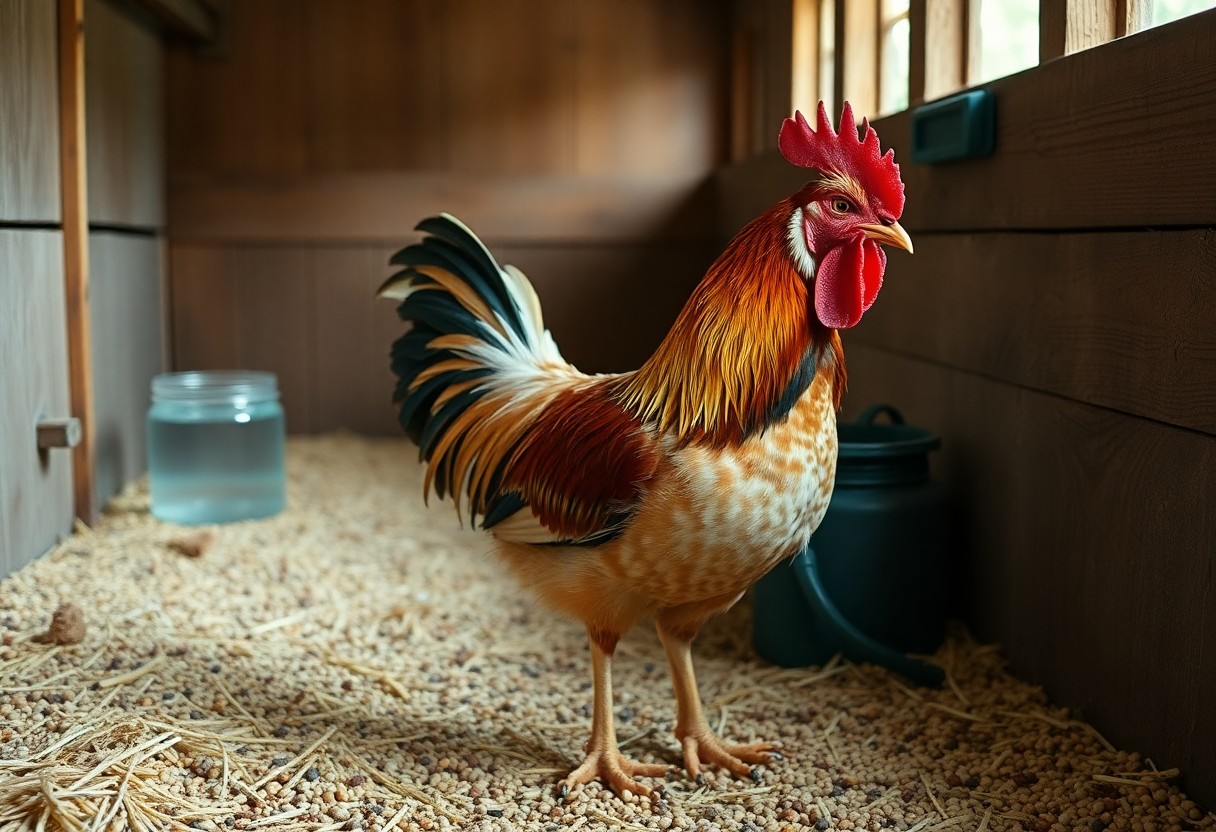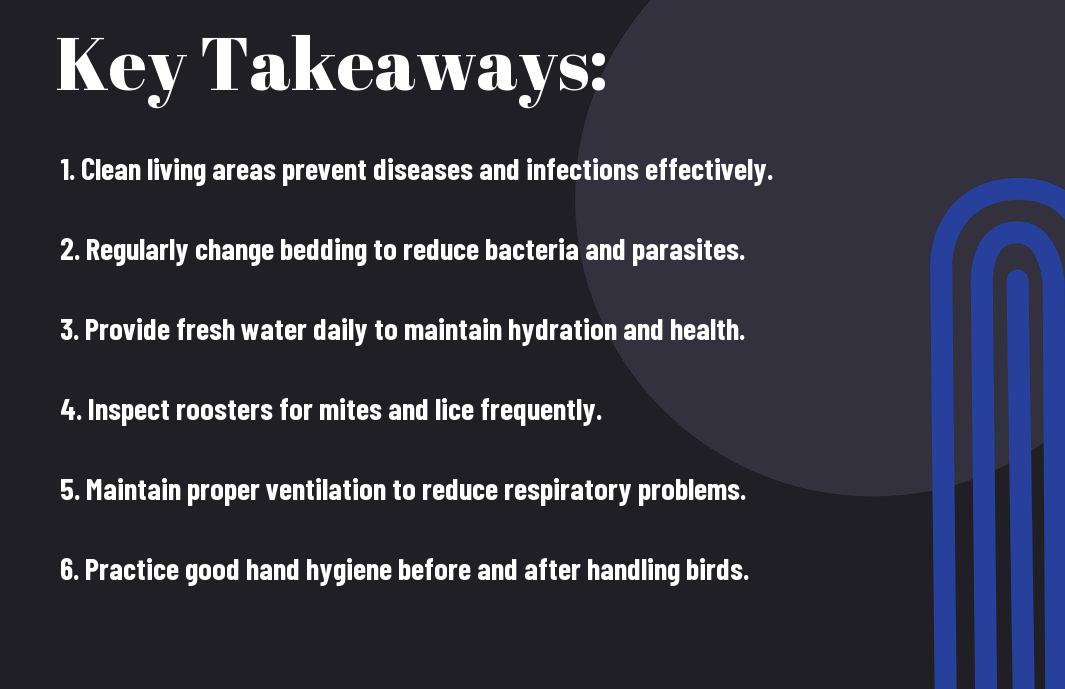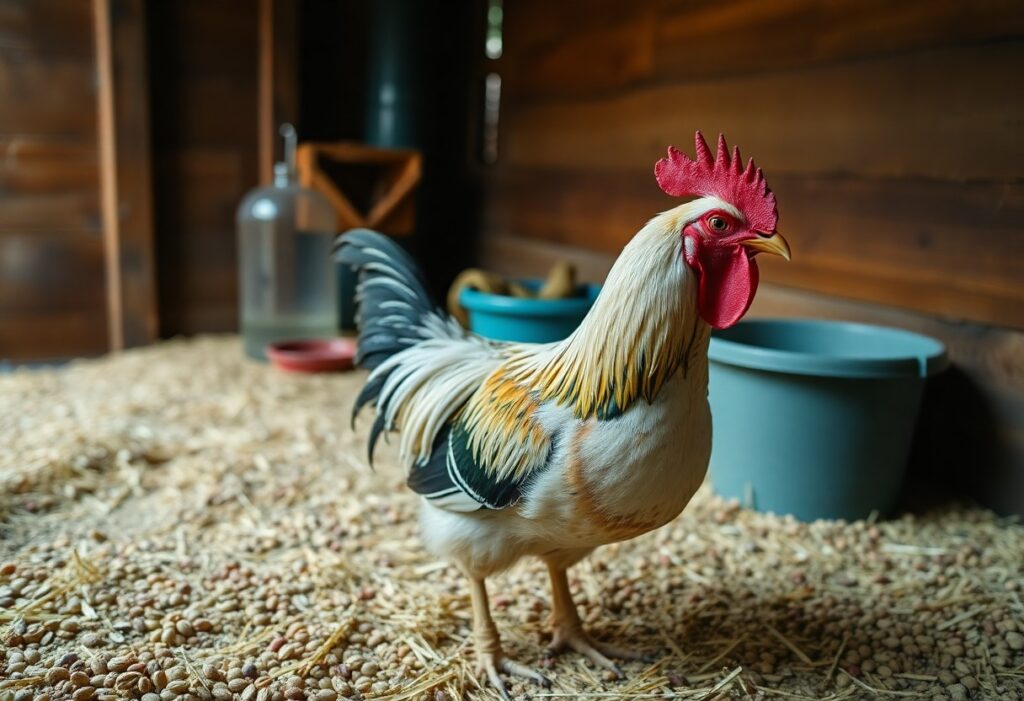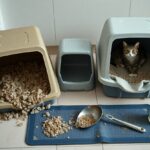Most successful rooster owners understand the impact of good hygiene practices on the overall health and well-being of their birds. By maintaining a clean and well-organized environment, you can significantly reduce the risk of diseases and stress among your flock. Simple steps, such as regular cleaning of coops and ensuring fresh water and feed, contribute to a healthier lifestyle for your roosters. This not only promotes optimal growth but also enhances their behavioral health, leading to more vibrant and productive birds.

Key Takeaways:
- Regular cleaning and sanitization of the coop and surrounding areas significantly reduce the risk of disease and parasites.
- Providing clean water and high-quality feed contributes to improved overall health and vitality in roosters.
- Monitoring rooster behavior and appearance can help identify any early signs of health issues, allowing for prompt intervention.

The Importance of Hygiene in Poultry Farming
The importance of hygiene in poultry farming cannot be overstated. Proper hygiene practices are necessary in preventing disease outbreaks and ensuring the overall health of your flock. By maintaining cleanliness, you can significantly reduce the risk of infections and enhance the living conditions for your birds, ultimately leading to better productivity and profitability. Implementing effective hygiene protocols is not just a best practice; it is necessary for the success of any poultry operation.
Impact on Rooster Health
Any lapse in hygiene can lead to serious health issues in roosters, such as respiratory infections and other contagious diseases. Regular cleaning and disinfection help maintain a safe environment, promoting optimal health and reducing stress. When you prioritize hygiene, your roosters thrive, resulting in higher breeding success and overall vitality.
Economic Benefits of Good Hygiene Practices
An investment in good hygiene practices yields significant economic benefits for your poultry operation. By preventing disease outbreaks, you can avoid costly veterinary bills and minimize flock losses. Additionally, healthier birds result in improved egg production and better meat quality, directly impacting your bottom line.
This profit-maximizing approach ensures that fewer resources are wasted on managing disease, allowing you to focus on growth and efficiency. By establishing strict hygiene protocols, you can effectively enhance productivity and reduce operational costs, creating a more sustainable and profitable poultry farming venture. In turn, the health of each rooster you manage becomes a key to financial success in your business.
Common Hygiene Challenges in Rooster Care
You may encounter several hygiene challenges while caring for your roosters. Maintaining optimal hygiene is imperative to prevent health issues, but various factors may complicate this effort. Understanding these challenges is the first step in fostering a healthier environment for your birds.
Environmental Factors
For effective rooster care, you need to address various environmental factors that can hinder hygiene. Key challenges include:
- Poor ventilation
- Unsanitary living conditions
- Inadequate shelter
- Excess moisture
The management of these environmental aspects is vital for maintaining your roosters’ well-being.
Disease Outbreaks
Rooster care can be severely impacted by disease outbreaks, which can escalate quickly if hygiene measures are not enforced. Keeping your flock healthy requires diligent observation and a proactive approach to prevent the spread of illness.
Factors such as overcrowding, stress, and poor sanitation can lead to disease outbreaks, putting your roosters at great risk. Common diseases like Avian Influenza or Newcastle disease can spread rapidly, affecting not only individual birds but the entire flock. Implementing strict hygiene practices like regular cleaning, disinfection, and monitoring can mitigate the dangers of these outbreaks. The importance of vigilance in disease management cannot be understated when striving for optimal rooster health.
Best Practices for Maintaining Cleanliness
For optimal rooster health and well-being, establishing and maintaining cleanliness in their environment is necessary. A clean habitat minimizes the risk of disease and promotes good hygiene, allowing your roosters to flourish. Adopting a routine cleaning schedule and ensuring proper sanitation measures can greatly enhance the overall quality of life for your flock.
Regular Cleaning and Disinfection
After each feeding and watering, it’s important to regularly check and clean your rooster’s living area. Removing any leftover feed, replacing bedding, and cleaning surfaces with a safe disinfectant helps reduce the buildup of harmful bacteria. Ensure that all equipment and utensils are scrubbed and sanitized to maintain a healthy environment.
Proper Waste Management
Any accumulated waste can pose significant health risks to your roosters. It is vital to manage waste efficiently by regularly removing droppings and using appropriate disposal methods. This not only reduces odors but also prevents harmful pathogens from spreading in their living area.
But proper waste management does more than just keep your environment clean; it helps prevent serious diseases and infections that can affect your flock’s well-being. Regularly clearing out droppings minimizes the risk of pest infestations and reduces the likelihood of parasitic infections. Consider composting the waste as a beneficial way to recycle nutrients, which creates healthy soil for your garden while simultaneously improving the health of your roosters.
Nutritional Considerations for Hygiene
Not only is proper hygiene important for your roosters’ overall health, but it is also interlinked with their nutrition. A well-balanced diet can play an integral role in maintaining hygiene by supporting the immune system and ensuring that your birds are resilient against diseases. Opting for high-quality feed and incorporating appropriate supplements will help create a strong foundation for your roosters’ well-being while simultaneously promoting a hygienic environment.
Diet’s Role in Immune Function
With a nutritious diet, you can significantly enhance your roosters’ immune function. Selecting feeds rich in vitamins, minerals, and antioxidants helps to strengthen their immune responses. This, in turn, enables your roosters to better combat pathogens and infections, minimizing disease outbreaks in your flock.
Supplementation for Enhanced Health
Along with a balanced diet, targeted supplementation can further improve your roosters’ health and hygiene. Essential nutrients like probiotics, omega fatty acids, and vitamins can enhance digestion and immune strength, facilitating the overall well-being of your flock.
Even the simplest addition of supplements can yield substantial benefits for your roosters. Implementing probiotics helps to promote gut health, leading to better nutrient absorption and a stronger immune system. Furthermore, incorporating omega fatty acids can improve feather quality and skin condition, which directly contributes to better hygiene. Vitamins, particularly Vitamin A and Vitamin E, are vital for immune response and overall vitality. By integrating these important supplements into your roosters’ diet, you are taking proactive steps toward enhancing their health and promoting a cleaner, healthier environment.
Monitoring Rooster Health Indicators
Your roosters’ health can significantly impact their overall productivity and well-being. By monitoring various health indicators, such as behavior, appetite, and physical appearance, you can swiftly identify any abnormalities or signs of distress. Regular observation will enable you to detect potential health issues early on, allowing for timely interventions that can help maintain optimum health and performance among your flock.
Signs of Poor Hygiene
Before you can improve your roosters’ health, it’s vital to identify the signs of poor hygiene. Look for symptoms such as foul odor, feather matting, or excessive droppings in their living environment. These indicators can signal underlying health issues, including parasites or infections, that could compromise your roosters’ overall well-being. Addressing these hygiene problems promptly will help prevent further complications and ensure a healthier flock.
Routine Health Assessments
Hygiene practices also involve conducting routine health assessments to keep your roosters in top shape. Regular evaluations allow you to monitor their weight, overall condition, and behavior, making it easier to spot any irregularities. Indeed, performing these assessments can reveal significant health concerns early on, such as parasite infestations or nutritional deficiencies. By establishing a consistent routine, you not only foster a healthier environment for your roosters but also promote longevity and enhanced productivity within your flock.
Educational Resources for Farmers
Keep informed about best practices for rooster health by utilizing a variety of educational resources tailored for farmers. Building your knowledge on hygiene standards not only enhances the welfare of your flock but also ensures a thriving farming operation. Engaging with these resources allows you to implement effective strategies that foster a healthier environment for your roosters.
Workshops and Training
Workshops can provide hands-on experience and expert guidance on maintaining optimal hygiene practices for roosters. You will have the opportunity to learn from professionals in the industry who can share valuable insights and techniques to boost your flock’s health. Participating in these training sessions also helps you connect with other farmers, creating a network of support and knowledge exchange.
Online Resources and Communities
Resources available online offer a wealth of information that you can access at your convenience. From webinars and instructional videos to articles and forums, these platforms enable you to stay updated on the latest in rooster care and hygiene practices.
Plus, many online communities consist of experienced farmers and specialists eager to share their insights and experiences. Engaging in discussions and asking questions can provide you with immediate solutions to challenges you may face. You will discover valuable tips, support, and resources that are imperative for enhancing your birds’ health and performance. Actively participating in these groups not only enriches your knowledge but also builds a community committed to improving rooster welfare.
To wrap up
With these considerations, you can significantly improve your rooster’s health and well-being by prioritizing good hygiene practices. Regularly cleaning the living environment, ensuring proper nutrition, and maintaining a routine health check will create a healthier habitat for your birds. By fostering these habits, you contribute to their overall longevity and vitality, allowing them to live happier and more productive lives. Your proactive approach will not only benefit your roosters but also enhance your experience as a poultry keeper.
Q: Why is good hygiene important for rooster health?
A: Good hygiene plays a vital role in maintaining the health of roosters. Proper sanitation practices help to prevent the spread of diseases and parasites, which can adversely affect their well-being. Regular cleaning of their living environment, including removing waste, providing fresh bedding, and ensuring clean water sources, assists in minimizing exposure to harmful pathogens. Additionally, maintaining good hygiene can improve overall flock performance, egg production, and the social behavior of the roosters, leading to a happier, healthier flock.
Q: What are some effective hygiene practices for caring for roosters?
A: There are several effective hygiene practices to keep in mind when caring for roosters. Firstly, regularly clean and disinfect housing areas to prevent the buildup of bacteria and parasites. This includes washing feeders and waterers on a routine basis. Secondly, implement a rotational grazing system if applicable, to prevent overgrazing and reduce the risk of exposure to contamination in the ground. Finally, ensure that the flock is monitored for signs of illness, and maintain a biosecurity protocol to minimize the risk of introducing new birds that may carry diseases.
Q: How can diet and nutrition impact the hygiene and overall health of roosters?
A: Diet and nutrition have a strong influence on the hygiene and overall health of roosters. Providing a balanced diet with the necessary vitamins and minerals is important for maintaining their immune system, which in turn helps them resist infections. Additionally, good nutrition encourages healthy digestive systems, which reduces waste buildup in their living area since properly digested food results in less offensive waste. High-quality feed, along with occasional treats such as fruits and vegetables, maintains their health and promotes optimal hygiene within the flock’s environment.











